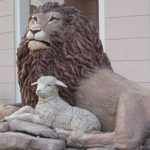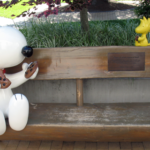We live in a culture obsessed by the desire for security.
One of the biggest proofs of our desire for security comes from a report provided by the Stockholm International Peace Research Institute: U.S. Military spending accounts for about 40 percent of all military spending on the planet. In a time when the angels herald “peace on earth, good will to all,” let that sink in.
 Jonathan DavisAnother indication of our need for security, which may hit closer to home, is our constant desire for more things, as if we’ll never have enough. Isn’t it ironic that the day after Thanksgiving—a day when we should thank God for everything we have, ideally bringing contentment—millions of us rush out to acquire more things. Our thankfulness and any contentment it may bring quickly become a joke.
Jonathan DavisAnother indication of our need for security, which may hit closer to home, is our constant desire for more things, as if we’ll never have enough. Isn’t it ironic that the day after Thanksgiving—a day when we should thank God for everything we have, ideally bringing contentment—millions of us rush out to acquire more things. Our thankfulness and any contentment it may bring quickly become a joke.
Advent must mean more than this. Christmas must mean more than this!
What if this Advent, we were delivered from our need for security—delivered from any desire to play it safe with God?
In London on Dec. 3, 1933, Dietrich Bonhoeffer asked in an Advent sermon: Do you want to be delivered? That is the only really important and decisive question Advent poses for us. Does there burn within us some lingering longing to know what deliverance really means?
If not, what would Advent mean to us? A bit of sentimentality? A little lifting of the spirit within us? A little kinder mood? But if there is something in this word “Advent” we have not yet known, that strangely warms our heart. If we suspect it could, once more, mean a turning point in our life, a returning to God, to Christ—why then are we not simply obedient, listening and hearing in our ears the clear call: Your deliverance draws nigh!
What would God’s deliverance look like?
What would God’s deliverance look like in your congregation this Advent season?
Sign up for our weekly edition and get all our headlines in your inbox on Thursdays
What if our congregations knew deliverance from:
• Needless conflict
• Endless anxiety
• Addiction to pet programs
• Low self-esteem
• Comparing ourselves to other churches
• Importing programs, ministry and theology that don’t belong to us
• Focusing on the “glory days”
Quite oppositely, our reconciliation to God through Christ frees us for:
• Transforming conflict into missional endeavor
• Living at peace with each other in spite of our differences
• Choosing people over programs
• Becoming content with God’s grace in the midst of our blemishes
• Claiming our identity as the Bride of Christ and as Children of God
• Celebrating what makes us uniquely equipped for ministry in our context
• Joyfully anticipating God’s new work in our midst
Freedom, or business as usual?
This Advent, will we choose Christ’s freedom, or business as usual?
Our desire for security may be one of the root causes for all the things that stifle growth and new life in our churches. Paradoxically, it isn’t until we let go of our need for playing it safe that our future is secure. Too many churches die because they always play it safe. Always become insular. Always hunker down.
People are naturally more open to others during Advent, which makes it the perfect time in the Christian year to consider becoming more open to God’s will in our lives and in our churches.
Traditionally, the Christian year does not begin on Jan. 1, but with the start of Advent. Our expectation of Christ’s coming into the world, of redemption, of Messiah, of restoration begins in Advent.
There is no better time to consider letting go of ideas, practices, theories, theologies, habits and other ways of being that may hinder God’s desire for our congregations. How will your church move from a desire for security to a desire for radical obedience to God?
The incarnation is ultimately a story of God not playing it safe. Leaving heaven and ministering to humans—who have rebelled against God since creation—is risky business. It may even lead to death on a cross.
At the start of a new church year, Christians (especially those of us in the West) should think long and hard about what brings us security. Is our security in Christ or in the things of this world?
We can drop our security blanket
Everybody has a favorite Christmas movie. One of mine is A Charlie Brown Christmas. Linus, who always carries a security blanket, famously recites the Christmas story from Luke 2 to explain “what Christmas is all about.”
In the monologue, immediately after he says “Fear not,” he drops his security blanket on the ground.
Jonathan Davis, pastor of Urbanna Baptist Church in Urbanna, Va., is a doctor of ministry candidate at Logdson Seminary, where his research focuses on equipping small-town churches for 21st century ministry. He is the founder of the Small Town Churches Network, which is dedicated to sharing research, ideas and tools to help small-town churches. Follow him on Twitter @jonathandavis_.















We seek to connect God’s story and God’s people around the world. To learn more about God’s story, click here.
Send comments and feedback to Eric Black, our editor. For comments to be published, please specify “letter to the editor.” Maximum length for publication is 300 words.